Psychology in Health: Definitions, Perspectives, and Factors Analysis
VerifiedAdded on 2022/08/19
|9
|2241
|22
Report
AI Summary
This report delves into the critical role of psychology in health, exploring various definitions of health and comparing them to highlight their evolution over time. It examines current perspectives in health psychology, particularly the biopsychosocial model, which emphasizes the interconnectedness of biological, psychological, and social factors in influencing health. The report also discusses physiological mechanisms underlying individual experiences of health and illness, and analyzes the effects of psychological, social, biological, and environmental factors on health outcomes. Finally, it outlines various treatments and methods employed to help individuals cope with health challenges and illnesses, providing a comprehensive overview of the field. The report uses the Harvard method of referencing.
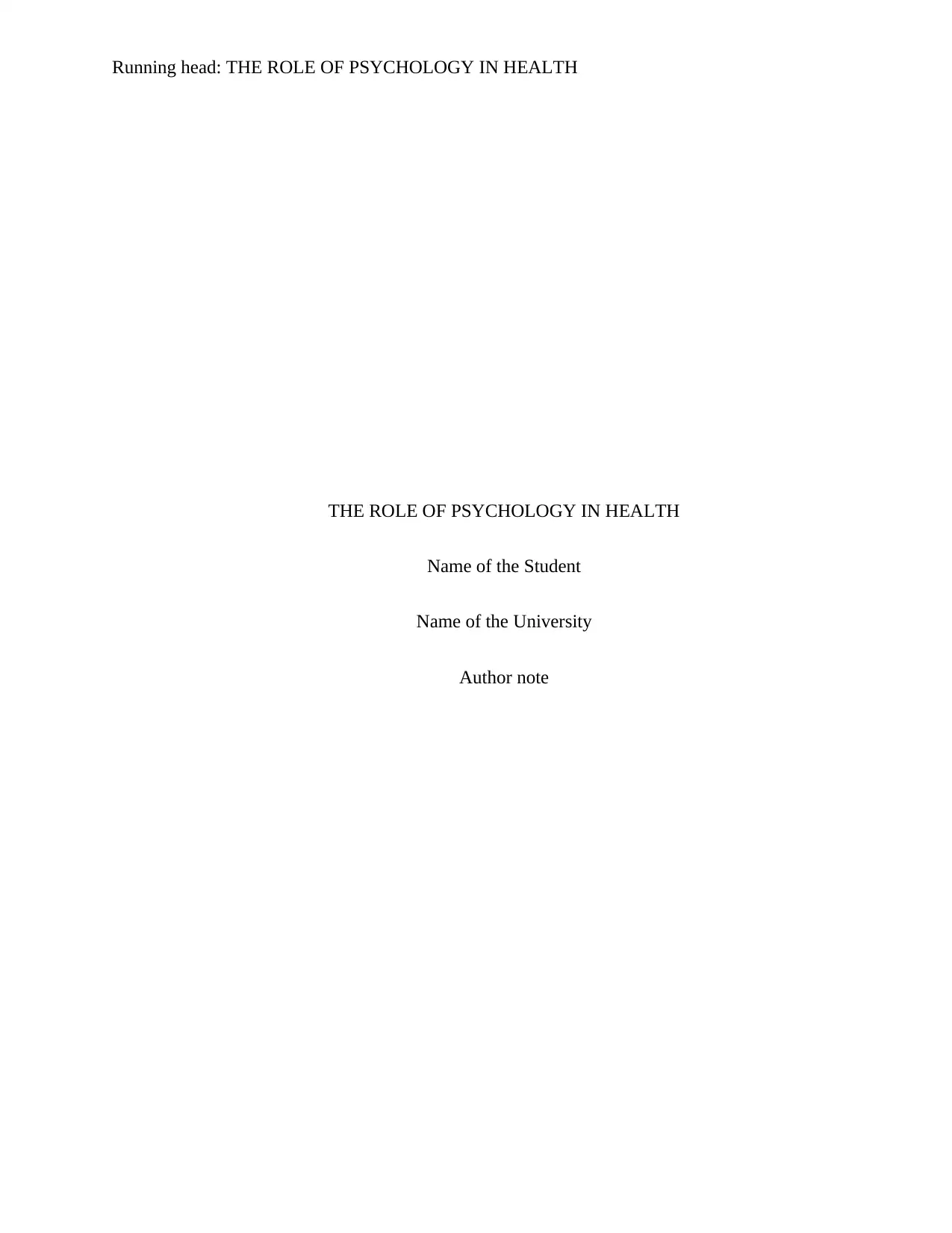
Running head: THE ROLE OF PSYCHOLOGY IN HEALTH
THE ROLE OF PSYCHOLOGY IN HEALTH
Name of the Student
Name of the University
Author note
THE ROLE OF PSYCHOLOGY IN HEALTH
Name of the Student
Name of the University
Author note
Paraphrase This Document
Need a fresh take? Get an instant paraphrase of this document with our AI Paraphraser
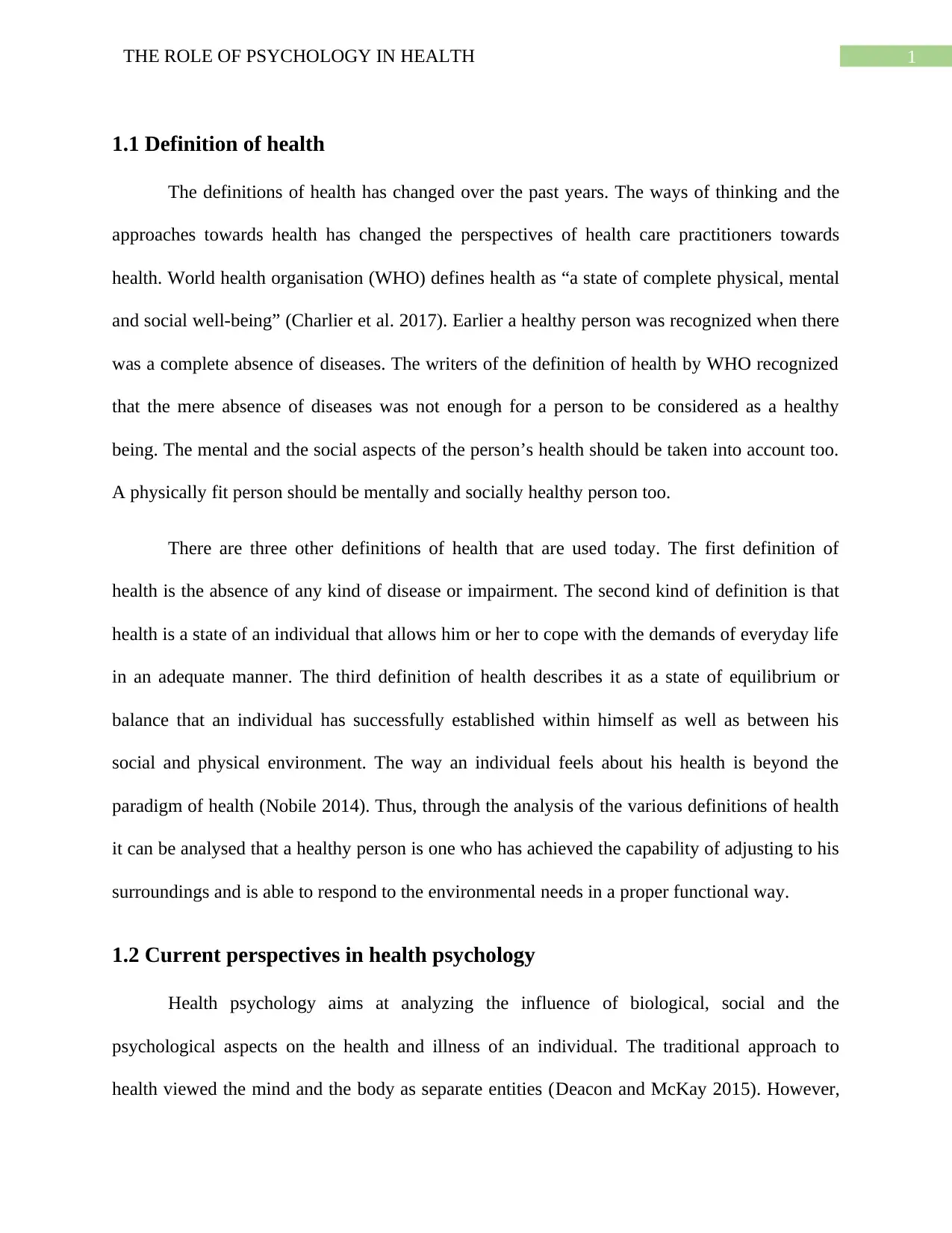
1THE ROLE OF PSYCHOLOGY IN HEALTH
1.1 Definition of health
The definitions of health has changed over the past years. The ways of thinking and the
approaches towards health has changed the perspectives of health care practitioners towards
health. World health organisation (WHO) defines health as “a state of complete physical, mental
and social well-being” (Charlier et al. 2017). Earlier a healthy person was recognized when there
was a complete absence of diseases. The writers of the definition of health by WHO recognized
that the mere absence of diseases was not enough for a person to be considered as a healthy
being. The mental and the social aspects of the person’s health should be taken into account too.
A physically fit person should be mentally and socially healthy person too.
There are three other definitions of health that are used today. The first definition of
health is the absence of any kind of disease or impairment. The second kind of definition is that
health is a state of an individual that allows him or her to cope with the demands of everyday life
in an adequate manner. The third definition of health describes it as a state of equilibrium or
balance that an individual has successfully established within himself as well as between his
social and physical environment. The way an individual feels about his health is beyond the
paradigm of health (Nobile 2014). Thus, through the analysis of the various definitions of health
it can be analysed that a healthy person is one who has achieved the capability of adjusting to his
surroundings and is able to respond to the environmental needs in a proper functional way.
1.2 Current perspectives in health psychology
Health psychology aims at analyzing the influence of biological, social and the
psychological aspects on the health and illness of an individual. The traditional approach to
health viewed the mind and the body as separate entities (Deacon and McKay 2015). However,
1.1 Definition of health
The definitions of health has changed over the past years. The ways of thinking and the
approaches towards health has changed the perspectives of health care practitioners towards
health. World health organisation (WHO) defines health as “a state of complete physical, mental
and social well-being” (Charlier et al. 2017). Earlier a healthy person was recognized when there
was a complete absence of diseases. The writers of the definition of health by WHO recognized
that the mere absence of diseases was not enough for a person to be considered as a healthy
being. The mental and the social aspects of the person’s health should be taken into account too.
A physically fit person should be mentally and socially healthy person too.
There are three other definitions of health that are used today. The first definition of
health is the absence of any kind of disease or impairment. The second kind of definition is that
health is a state of an individual that allows him or her to cope with the demands of everyday life
in an adequate manner. The third definition of health describes it as a state of equilibrium or
balance that an individual has successfully established within himself as well as between his
social and physical environment. The way an individual feels about his health is beyond the
paradigm of health (Nobile 2014). Thus, through the analysis of the various definitions of health
it can be analysed that a healthy person is one who has achieved the capability of adjusting to his
surroundings and is able to respond to the environmental needs in a proper functional way.
1.2 Current perspectives in health psychology
Health psychology aims at analyzing the influence of biological, social and the
psychological aspects on the health and illness of an individual. The traditional approach to
health viewed the mind and the body as separate entities (Deacon and McKay 2015). However,
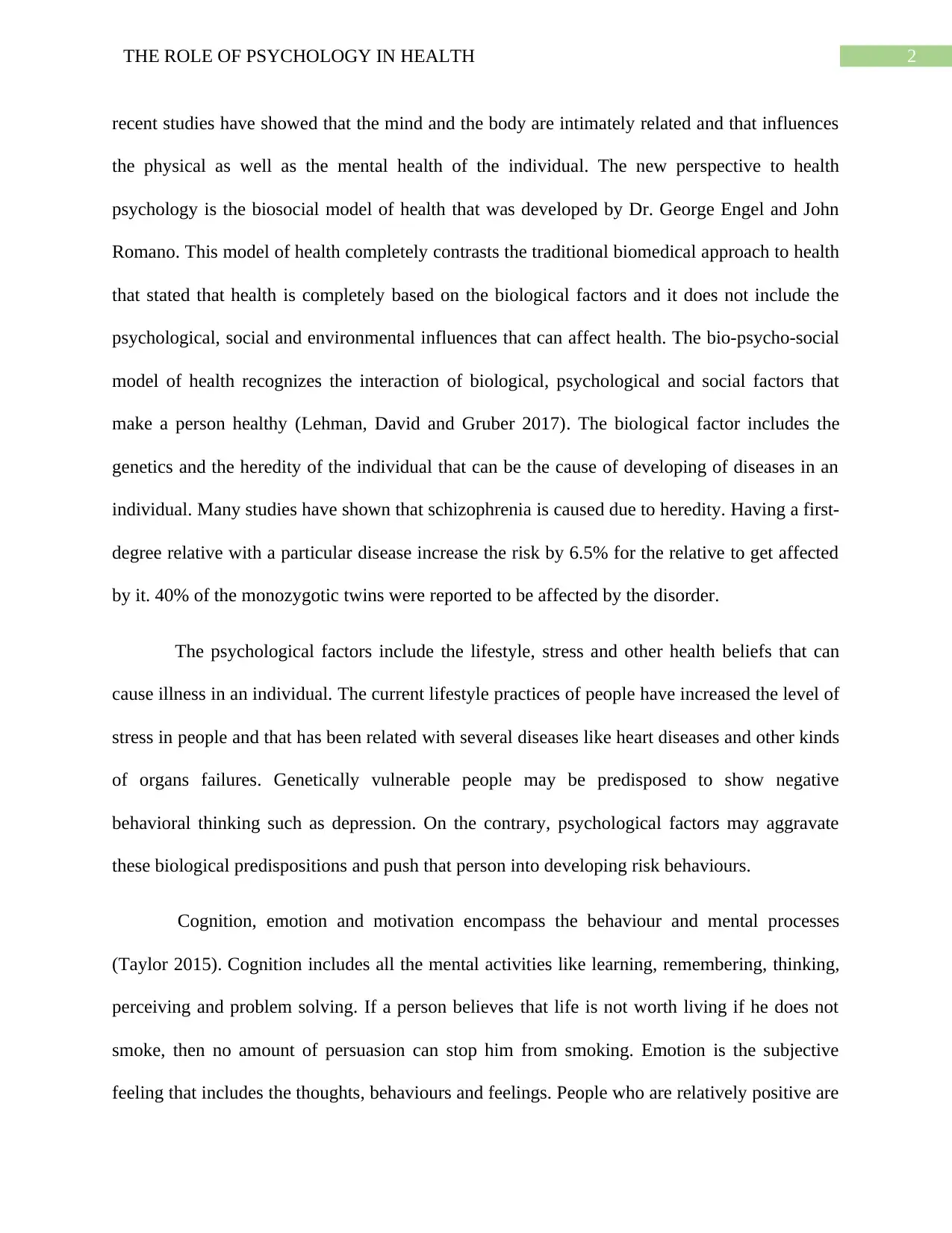
2THE ROLE OF PSYCHOLOGY IN HEALTH
recent studies have showed that the mind and the body are intimately related and that influences
the physical as well as the mental health of the individual. The new perspective to health
psychology is the biosocial model of health that was developed by Dr. George Engel and John
Romano. This model of health completely contrasts the traditional biomedical approach to health
that stated that health is completely based on the biological factors and it does not include the
psychological, social and environmental influences that can affect health. The bio-psycho-social
model of health recognizes the interaction of biological, psychological and social factors that
make a person healthy (Lehman, David and Gruber 2017). The biological factor includes the
genetics and the heredity of the individual that can be the cause of developing of diseases in an
individual. Many studies have shown that schizophrenia is caused due to heredity. Having a first-
degree relative with a particular disease increase the risk by 6.5% for the relative to get affected
by it. 40% of the monozygotic twins were reported to be affected by the disorder.
The psychological factors include the lifestyle, stress and other health beliefs that can
cause illness in an individual. The current lifestyle practices of people have increased the level of
stress in people and that has been related with several diseases like heart diseases and other kinds
of organs failures. Genetically vulnerable people may be predisposed to show negative
behavioral thinking such as depression. On the contrary, psychological factors may aggravate
these biological predispositions and push that person into developing risk behaviours.
Cognition, emotion and motivation encompass the behaviour and mental processes
(Taylor 2015). Cognition includes all the mental activities like learning, remembering, thinking,
perceiving and problem solving. If a person believes that life is not worth living if he does not
smoke, then no amount of persuasion can stop him from smoking. Emotion is the subjective
feeling that includes the thoughts, behaviours and feelings. People who are relatively positive are
recent studies have showed that the mind and the body are intimately related and that influences
the physical as well as the mental health of the individual. The new perspective to health
psychology is the biosocial model of health that was developed by Dr. George Engel and John
Romano. This model of health completely contrasts the traditional biomedical approach to health
that stated that health is completely based on the biological factors and it does not include the
psychological, social and environmental influences that can affect health. The bio-psycho-social
model of health recognizes the interaction of biological, psychological and social factors that
make a person healthy (Lehman, David and Gruber 2017). The biological factor includes the
genetics and the heredity of the individual that can be the cause of developing of diseases in an
individual. Many studies have shown that schizophrenia is caused due to heredity. Having a first-
degree relative with a particular disease increase the risk by 6.5% for the relative to get affected
by it. 40% of the monozygotic twins were reported to be affected by the disorder.
The psychological factors include the lifestyle, stress and other health beliefs that can
cause illness in an individual. The current lifestyle practices of people have increased the level of
stress in people and that has been related with several diseases like heart diseases and other kinds
of organs failures. Genetically vulnerable people may be predisposed to show negative
behavioral thinking such as depression. On the contrary, psychological factors may aggravate
these biological predispositions and push that person into developing risk behaviours.
Cognition, emotion and motivation encompass the behaviour and mental processes
(Taylor 2015). Cognition includes all the mental activities like learning, remembering, thinking,
perceiving and problem solving. If a person believes that life is not worth living if he does not
smoke, then no amount of persuasion can stop him from smoking. Emotion is the subjective
feeling that includes the thoughts, behaviours and feelings. People who are relatively positive are
⊘ This is a preview!⊘
Do you want full access?
Subscribe today to unlock all pages.

Trusted by 1+ million students worldwide
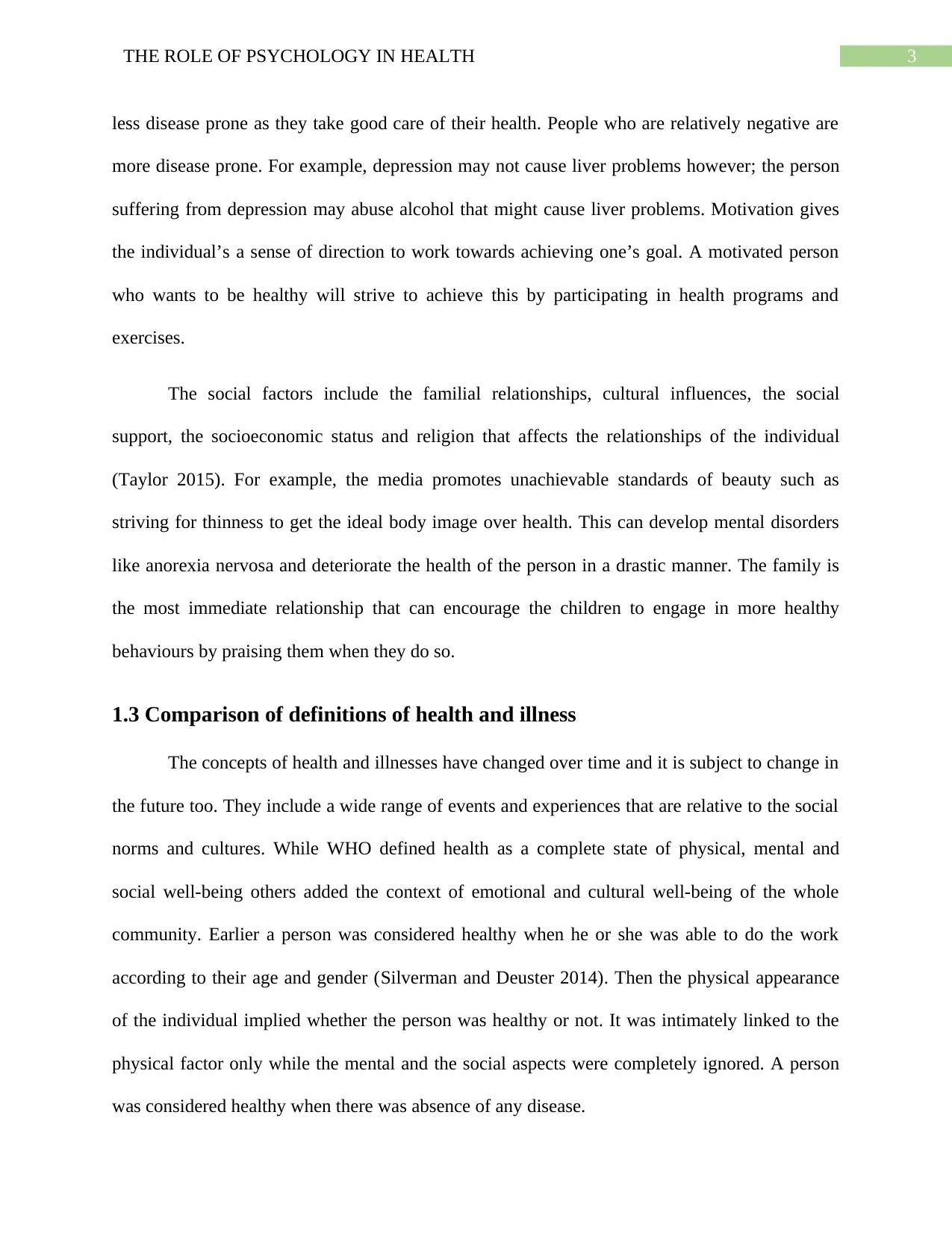
3THE ROLE OF PSYCHOLOGY IN HEALTH
less disease prone as they take good care of their health. People who are relatively negative are
more disease prone. For example, depression may not cause liver problems however; the person
suffering from depression may abuse alcohol that might cause liver problems. Motivation gives
the individual’s a sense of direction to work towards achieving one’s goal. A motivated person
who wants to be healthy will strive to achieve this by participating in health programs and
exercises.
The social factors include the familial relationships, cultural influences, the social
support, the socioeconomic status and religion that affects the relationships of the individual
(Taylor 2015). For example, the media promotes unachievable standards of beauty such as
striving for thinness to get the ideal body image over health. This can develop mental disorders
like anorexia nervosa and deteriorate the health of the person in a drastic manner. The family is
the most immediate relationship that can encourage the children to engage in more healthy
behaviours by praising them when they do so.
1.3 Comparison of definitions of health and illness
The concepts of health and illnesses have changed over time and it is subject to change in
the future too. They include a wide range of events and experiences that are relative to the social
norms and cultures. While WHO defined health as a complete state of physical, mental and
social well-being others added the context of emotional and cultural well-being of the whole
community. Earlier a person was considered healthy when he or she was able to do the work
according to their age and gender (Silverman and Deuster 2014). Then the physical appearance
of the individual implied whether the person was healthy or not. It was intimately linked to the
physical factor only while the mental and the social aspects were completely ignored. A person
was considered healthy when there was absence of any disease.
less disease prone as they take good care of their health. People who are relatively negative are
more disease prone. For example, depression may not cause liver problems however; the person
suffering from depression may abuse alcohol that might cause liver problems. Motivation gives
the individual’s a sense of direction to work towards achieving one’s goal. A motivated person
who wants to be healthy will strive to achieve this by participating in health programs and
exercises.
The social factors include the familial relationships, cultural influences, the social
support, the socioeconomic status and religion that affects the relationships of the individual
(Taylor 2015). For example, the media promotes unachievable standards of beauty such as
striving for thinness to get the ideal body image over health. This can develop mental disorders
like anorexia nervosa and deteriorate the health of the person in a drastic manner. The family is
the most immediate relationship that can encourage the children to engage in more healthy
behaviours by praising them when they do so.
1.3 Comparison of definitions of health and illness
The concepts of health and illnesses have changed over time and it is subject to change in
the future too. They include a wide range of events and experiences that are relative to the social
norms and cultures. While WHO defined health as a complete state of physical, mental and
social well-being others added the context of emotional and cultural well-being of the whole
community. Earlier a person was considered healthy when he or she was able to do the work
according to their age and gender (Silverman and Deuster 2014). Then the physical appearance
of the individual implied whether the person was healthy or not. It was intimately linked to the
physical factor only while the mental and the social aspects were completely ignored. A person
was considered healthy when there was absence of any disease.
Paraphrase This Document
Need a fresh take? Get an instant paraphrase of this document with our AI Paraphraser
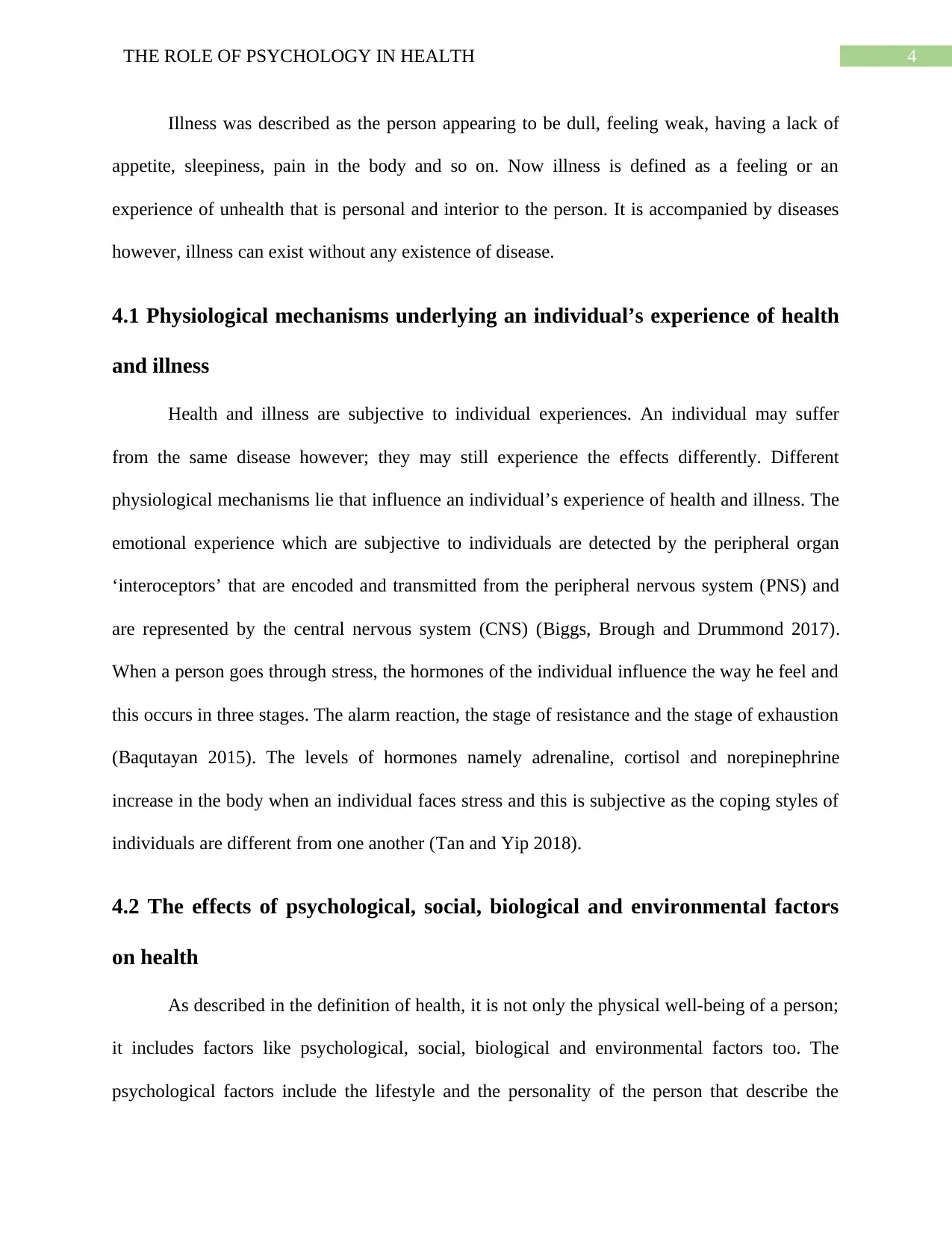
4THE ROLE OF PSYCHOLOGY IN HEALTH
Illness was described as the person appearing to be dull, feeling weak, having a lack of
appetite, sleepiness, pain in the body and so on. Now illness is defined as a feeling or an
experience of unhealth that is personal and interior to the person. It is accompanied by diseases
however, illness can exist without any existence of disease.
4.1 Physiological mechanisms underlying an individual’s experience of health
and illness
Health and illness are subjective to individual experiences. An individual may suffer
from the same disease however; they may still experience the effects differently. Different
physiological mechanisms lie that influence an individual’s experience of health and illness. The
emotional experience which are subjective to individuals are detected by the peripheral organ
‘interoceptors’ that are encoded and transmitted from the peripheral nervous system (PNS) and
are represented by the central nervous system (CNS) (Biggs, Brough and Drummond 2017).
When a person goes through stress, the hormones of the individual influence the way he feel and
this occurs in three stages. The alarm reaction, the stage of resistance and the stage of exhaustion
(Baqutayan 2015). The levels of hormones namely adrenaline, cortisol and norepinephrine
increase in the body when an individual faces stress and this is subjective as the coping styles of
individuals are different from one another (Tan and Yip 2018).
4.2 The effects of psychological, social, biological and environmental factors
on health
As described in the definition of health, it is not only the physical well-being of a person;
it includes factors like psychological, social, biological and environmental factors too. The
psychological factors include the lifestyle and the personality of the person that describe the
Illness was described as the person appearing to be dull, feeling weak, having a lack of
appetite, sleepiness, pain in the body and so on. Now illness is defined as a feeling or an
experience of unhealth that is personal and interior to the person. It is accompanied by diseases
however, illness can exist without any existence of disease.
4.1 Physiological mechanisms underlying an individual’s experience of health
and illness
Health and illness are subjective to individual experiences. An individual may suffer
from the same disease however; they may still experience the effects differently. Different
physiological mechanisms lie that influence an individual’s experience of health and illness. The
emotional experience which are subjective to individuals are detected by the peripheral organ
‘interoceptors’ that are encoded and transmitted from the peripheral nervous system (PNS) and
are represented by the central nervous system (CNS) (Biggs, Brough and Drummond 2017).
When a person goes through stress, the hormones of the individual influence the way he feel and
this occurs in three stages. The alarm reaction, the stage of resistance and the stage of exhaustion
(Baqutayan 2015). The levels of hormones namely adrenaline, cortisol and norepinephrine
increase in the body when an individual faces stress and this is subjective as the coping styles of
individuals are different from one another (Tan and Yip 2018).
4.2 The effects of psychological, social, biological and environmental factors
on health
As described in the definition of health, it is not only the physical well-being of a person;
it includes factors like psychological, social, biological and environmental factors too. The
psychological factors include the lifestyle and the personality of the person that describe the
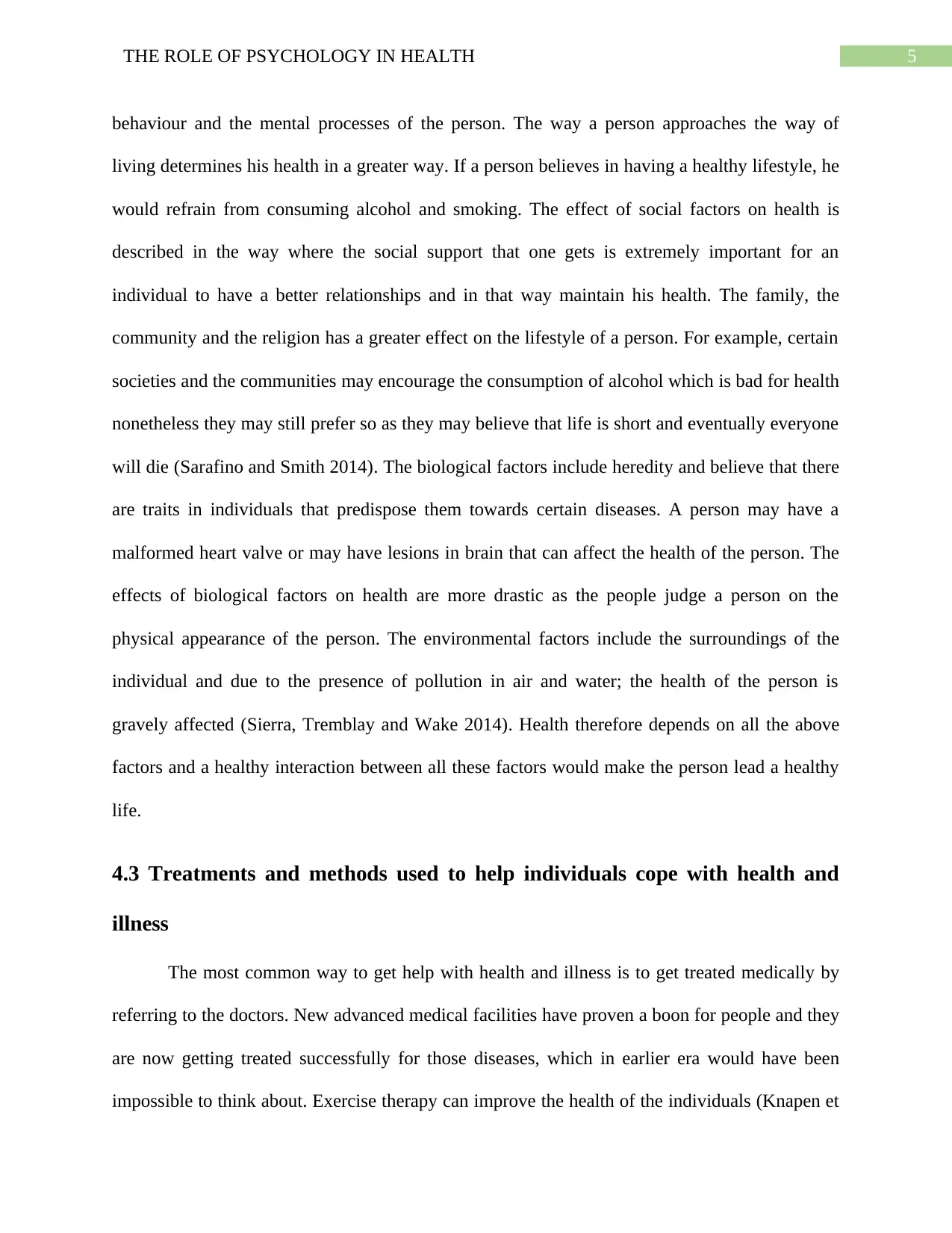
5THE ROLE OF PSYCHOLOGY IN HEALTH
behaviour and the mental processes of the person. The way a person approaches the way of
living determines his health in a greater way. If a person believes in having a healthy lifestyle, he
would refrain from consuming alcohol and smoking. The effect of social factors on health is
described in the way where the social support that one gets is extremely important for an
individual to have a better relationships and in that way maintain his health. The family, the
community and the religion has a greater effect on the lifestyle of a person. For example, certain
societies and the communities may encourage the consumption of alcohol which is bad for health
nonetheless they may still prefer so as they may believe that life is short and eventually everyone
will die (Sarafino and Smith 2014). The biological factors include heredity and believe that there
are traits in individuals that predispose them towards certain diseases. A person may have a
malformed heart valve or may have lesions in brain that can affect the health of the person. The
effects of biological factors on health are more drastic as the people judge a person on the
physical appearance of the person. The environmental factors include the surroundings of the
individual and due to the presence of pollution in air and water; the health of the person is
gravely affected (Sierra, Tremblay and Wake 2014). Health therefore depends on all the above
factors and a healthy interaction between all these factors would make the person lead a healthy
life.
4.3 Treatments and methods used to help individuals cope with health and
illness
The most common way to get help with health and illness is to get treated medically by
referring to the doctors. New advanced medical facilities have proven a boon for people and they
are now getting treated successfully for those diseases, which in earlier era would have been
impossible to think about. Exercise therapy can improve the health of the individuals (Knapen et
behaviour and the mental processes of the person. The way a person approaches the way of
living determines his health in a greater way. If a person believes in having a healthy lifestyle, he
would refrain from consuming alcohol and smoking. The effect of social factors on health is
described in the way where the social support that one gets is extremely important for an
individual to have a better relationships and in that way maintain his health. The family, the
community and the religion has a greater effect on the lifestyle of a person. For example, certain
societies and the communities may encourage the consumption of alcohol which is bad for health
nonetheless they may still prefer so as they may believe that life is short and eventually everyone
will die (Sarafino and Smith 2014). The biological factors include heredity and believe that there
are traits in individuals that predispose them towards certain diseases. A person may have a
malformed heart valve or may have lesions in brain that can affect the health of the person. The
effects of biological factors on health are more drastic as the people judge a person on the
physical appearance of the person. The environmental factors include the surroundings of the
individual and due to the presence of pollution in air and water; the health of the person is
gravely affected (Sierra, Tremblay and Wake 2014). Health therefore depends on all the above
factors and a healthy interaction between all these factors would make the person lead a healthy
life.
4.3 Treatments and methods used to help individuals cope with health and
illness
The most common way to get help with health and illness is to get treated medically by
referring to the doctors. New advanced medical facilities have proven a boon for people and they
are now getting treated successfully for those diseases, which in earlier era would have been
impossible to think about. Exercise therapy can improve the health of the individuals (Knapen et
⊘ This is a preview!⊘
Do you want full access?
Subscribe today to unlock all pages.

Trusted by 1+ million students worldwide
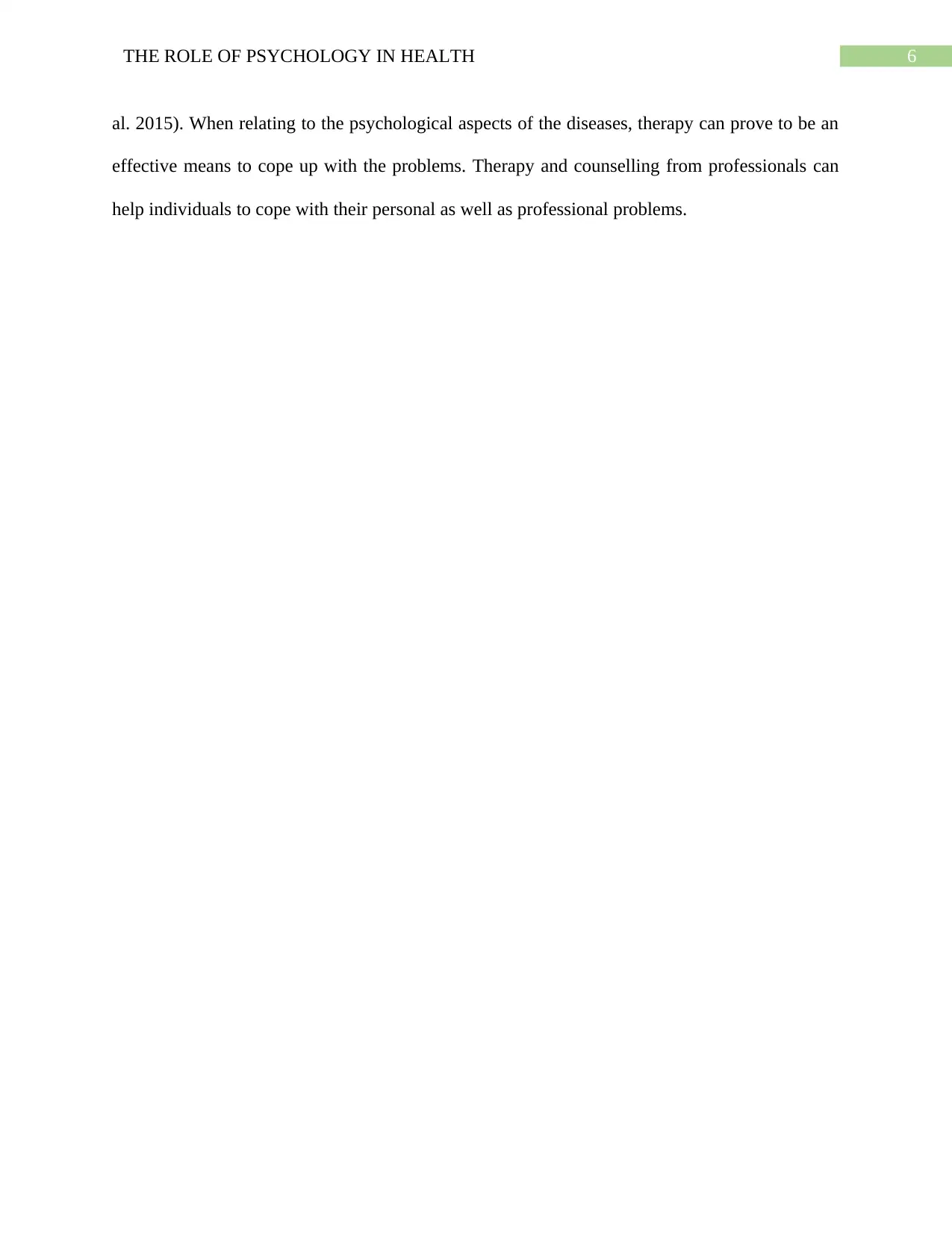
6THE ROLE OF PSYCHOLOGY IN HEALTH
al. 2015). When relating to the psychological aspects of the diseases, therapy can prove to be an
effective means to cope up with the problems. Therapy and counselling from professionals can
help individuals to cope with their personal as well as professional problems.
al. 2015). When relating to the psychological aspects of the diseases, therapy can prove to be an
effective means to cope up with the problems. Therapy and counselling from professionals can
help individuals to cope with their personal as well as professional problems.
Paraphrase This Document
Need a fresh take? Get an instant paraphrase of this document with our AI Paraphraser
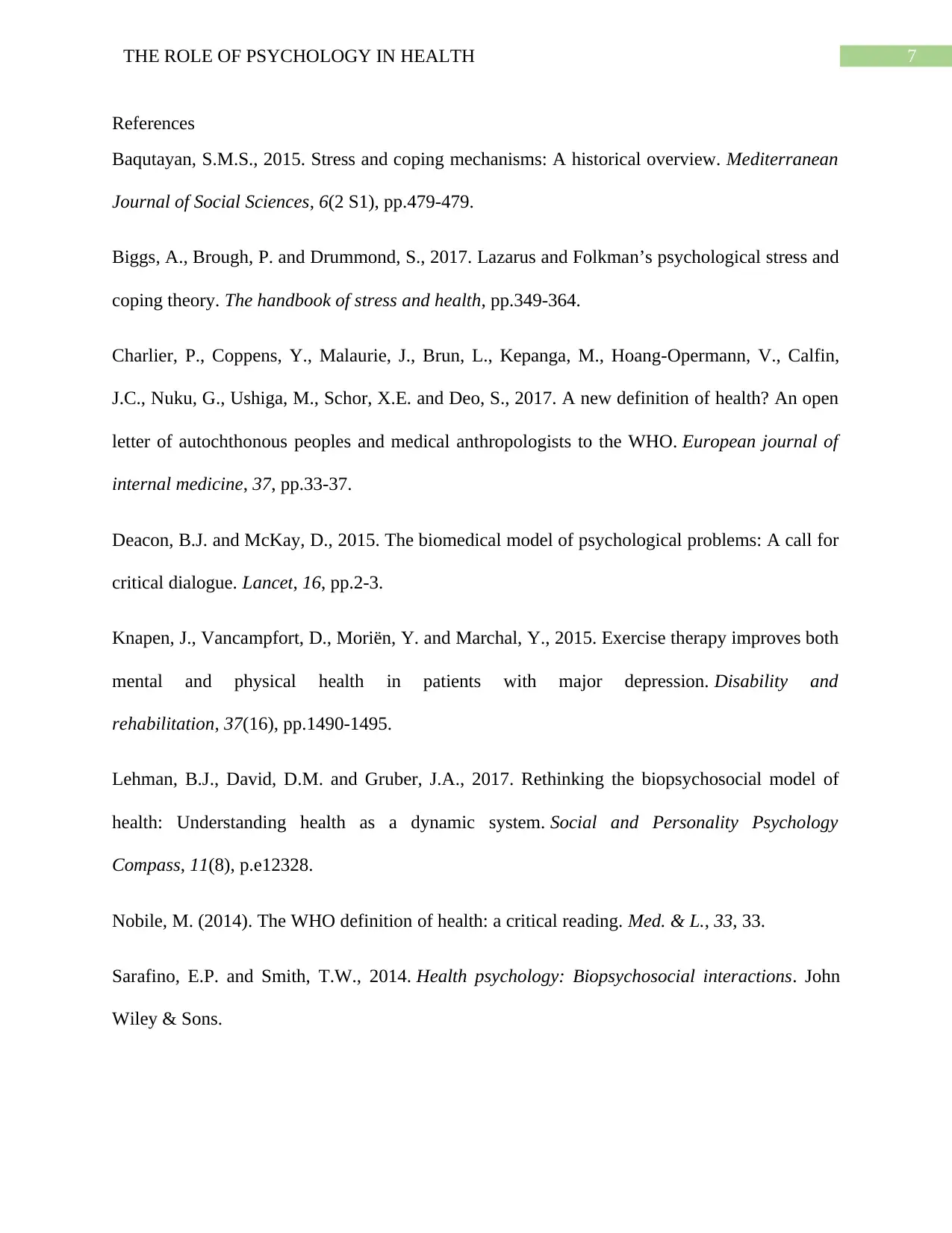
7THE ROLE OF PSYCHOLOGY IN HEALTH
References
Baqutayan, S.M.S., 2015. Stress and coping mechanisms: A historical overview. Mediterranean
Journal of Social Sciences, 6(2 S1), pp.479-479.
Biggs, A., Brough, P. and Drummond, S., 2017. Lazarus and Folkman’s psychological stress and
coping theory. The handbook of stress and health, pp.349-364.
Charlier, P., Coppens, Y., Malaurie, J., Brun, L., Kepanga, M., Hoang-Opermann, V., Calfin,
J.C., Nuku, G., Ushiga, M., Schor, X.E. and Deo, S., 2017. A new definition of health? An open
letter of autochthonous peoples and medical anthropologists to the WHO. European journal of
internal medicine, 37, pp.33-37.
Deacon, B.J. and McKay, D., 2015. The biomedical model of psychological problems: A call for
critical dialogue. Lancet, 16, pp.2-3.
Knapen, J., Vancampfort, D., Moriën, Y. and Marchal, Y., 2015. Exercise therapy improves both
mental and physical health in patients with major depression. Disability and
rehabilitation, 37(16), pp.1490-1495.
Lehman, B.J., David, D.M. and Gruber, J.A., 2017. Rethinking the biopsychosocial model of
health: Understanding health as a dynamic system. Social and Personality Psychology
Compass, 11(8), p.e12328.
Nobile, M. (2014). The WHO definition of health: a critical reading. Med. & L., 33, 33.
Sarafino, E.P. and Smith, T.W., 2014. Health psychology: Biopsychosocial interactions. John
Wiley & Sons.
References
Baqutayan, S.M.S., 2015. Stress and coping mechanisms: A historical overview. Mediterranean
Journal of Social Sciences, 6(2 S1), pp.479-479.
Biggs, A., Brough, P. and Drummond, S., 2017. Lazarus and Folkman’s psychological stress and
coping theory. The handbook of stress and health, pp.349-364.
Charlier, P., Coppens, Y., Malaurie, J., Brun, L., Kepanga, M., Hoang-Opermann, V., Calfin,
J.C., Nuku, G., Ushiga, M., Schor, X.E. and Deo, S., 2017. A new definition of health? An open
letter of autochthonous peoples and medical anthropologists to the WHO. European journal of
internal medicine, 37, pp.33-37.
Deacon, B.J. and McKay, D., 2015. The biomedical model of psychological problems: A call for
critical dialogue. Lancet, 16, pp.2-3.
Knapen, J., Vancampfort, D., Moriën, Y. and Marchal, Y., 2015. Exercise therapy improves both
mental and physical health in patients with major depression. Disability and
rehabilitation, 37(16), pp.1490-1495.
Lehman, B.J., David, D.M. and Gruber, J.A., 2017. Rethinking the biopsychosocial model of
health: Understanding health as a dynamic system. Social and Personality Psychology
Compass, 11(8), p.e12328.
Nobile, M. (2014). The WHO definition of health: a critical reading. Med. & L., 33, 33.
Sarafino, E.P. and Smith, T.W., 2014. Health psychology: Biopsychosocial interactions. John
Wiley & Sons.
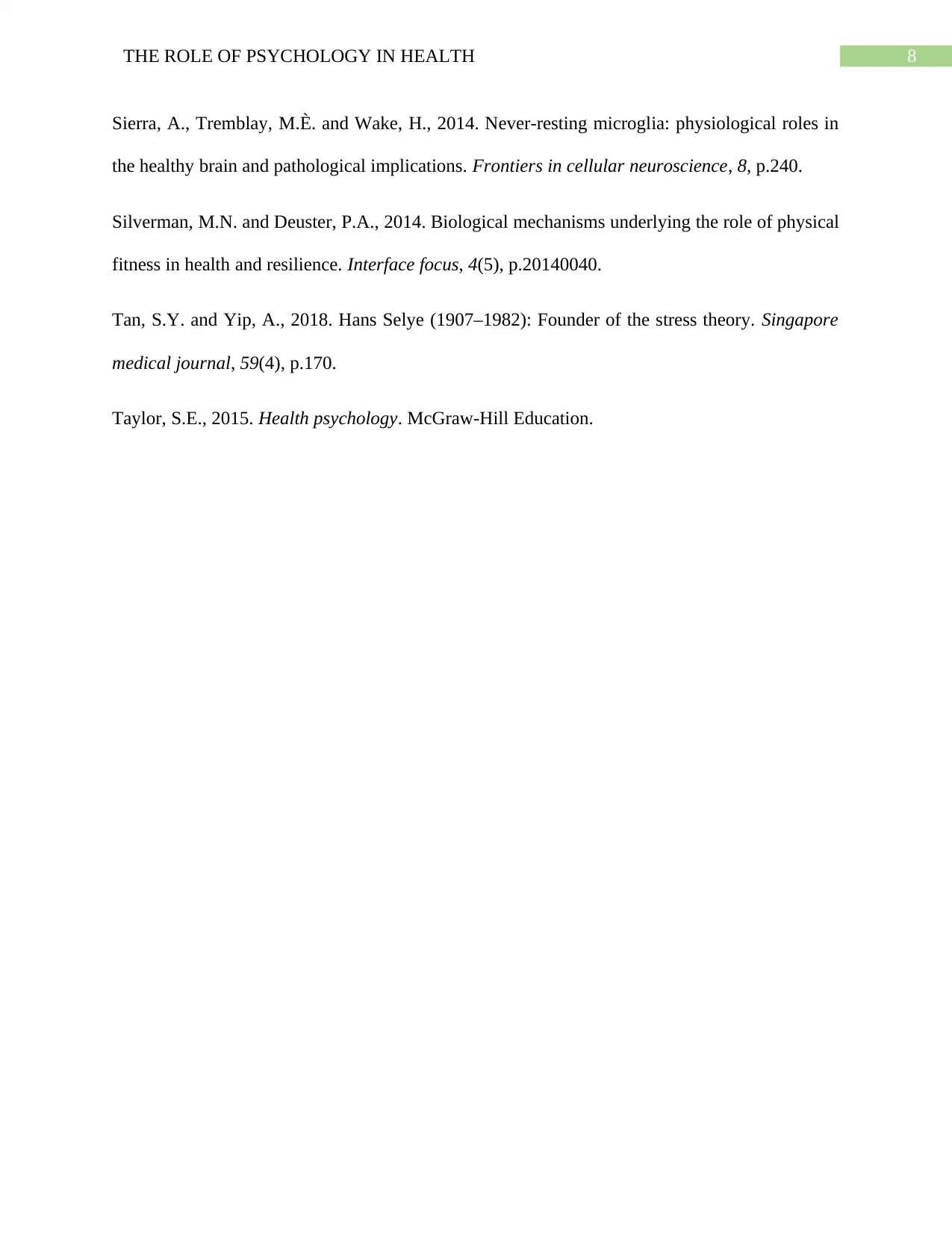
8THE ROLE OF PSYCHOLOGY IN HEALTH
Sierra, A., Tremblay, M.È. and Wake, H., 2014. Never-resting microglia: physiological roles in
the healthy brain and pathological implications. Frontiers in cellular neuroscience, 8, p.240.
Silverman, M.N. and Deuster, P.A., 2014. Biological mechanisms underlying the role of physical
fitness in health and resilience. Interface focus, 4(5), p.20140040.
Tan, S.Y. and Yip, A., 2018. Hans Selye (1907–1982): Founder of the stress theory. Singapore
medical journal, 59(4), p.170.
Taylor, S.E., 2015. Health psychology. McGraw-Hill Education.
Sierra, A., Tremblay, M.È. and Wake, H., 2014. Never-resting microglia: physiological roles in
the healthy brain and pathological implications. Frontiers in cellular neuroscience, 8, p.240.
Silverman, M.N. and Deuster, P.A., 2014. Biological mechanisms underlying the role of physical
fitness in health and resilience. Interface focus, 4(5), p.20140040.
Tan, S.Y. and Yip, A., 2018. Hans Selye (1907–1982): Founder of the stress theory. Singapore
medical journal, 59(4), p.170.
Taylor, S.E., 2015. Health psychology. McGraw-Hill Education.
⊘ This is a preview!⊘
Do you want full access?
Subscribe today to unlock all pages.

Trusted by 1+ million students worldwide
1 out of 9
Related Documents
Your All-in-One AI-Powered Toolkit for Academic Success.
+13062052269
info@desklib.com
Available 24*7 on WhatsApp / Email
![[object Object]](/_next/static/media/star-bottom.7253800d.svg)
Unlock your academic potential
Copyright © 2020–2026 A2Z Services. All Rights Reserved. Developed and managed by ZUCOL.




